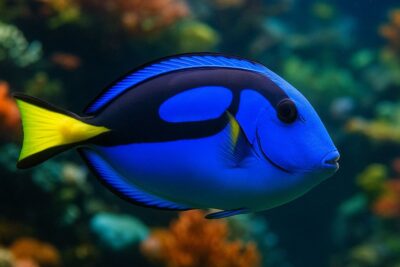 Tropical fish are the living jewels of the ocean. With their bright colors, diverse shapes, and dynamic movements, they’re often the stars of coral reef ecosystems. But their beauty serves more than just visual appeal, it plays a vital ecological role. At WQA.info – World-Wide Q&A, we explore why tropical fish are so vibrant and how they contribute to the health of coral reefs.
Tropical fish are the living jewels of the ocean. With their bright colors, diverse shapes, and dynamic movements, they’re often the stars of coral reef ecosystems. But their beauty serves more than just visual appeal, it plays a vital ecological role. At WQA.info – World-Wide Q&A, we explore why tropical fish are so vibrant and how they contribute to the health of coral reefs.
Why Are Tropical Fish So Colorful?
The striking colors of tropical fish are due to pigments and structural coloration:
- Pigments: Natural chemicals that absorb certain light wavelengths.
- Structural coloration: Microscopic structures reflect light, creating iridescent or metallic effects.
These colors help fish:
- Camouflage among corals and plants
- Warn predators of toxicity or unpalatability
- Attract mates during breeding seasons
- Identify members of their own species
For example, the Regal Blue Tang (like the one featured above) uses its bold colors for recognition and defense within reef environments.
Living in Coral Reefs
Tropical fish live in warm, shallow waters around coral reefs, where their color helps them blend with brightly lit environments. Coral reefs provide:
- Shelter from predators
- Feeding grounds for plankton, algae, and small invertebrates
- Breeding zones for safe reproduction
In return, tropical fish help coral reefs by:
- Controlling algae growth through grazing
- Transporting nutrients as they feed and excrete
- Cleaning parasites from other marine animals
This creates a balanced and self-sustaining environment.
Types of Tropical Fish
Popular and ecologically important tropical fish include:
- Clownfish: Symbiotic with sea anemones
- Parrotfish: Graze on algae and help produce sand by digesting coral
- Angelfish: Bright and territorial with complex behaviors
- Butterflyfish: Often indicators of reef health
- Damsel fish: Small but aggressive, essential in reef defense
Each species plays a unique role in reef maintenance and biodiversity.
Threats to Tropical Fish and Coral Reefs
Despite their resilience, both tropical fish and their habitats face growing threats:
- Coral bleaching due to warming oceans
- Pollution from plastics and chemicals
- Overfishing and illegal aquarium trade
- Ocean acidification, weakening coral structures
When reefs die, tropical fish lose their homes, and entire ecosystems collapse.
How to Protect Tropical Fish
- Support sustainable tourism: Choose eco-certified snorkeling and diving tours.
- Avoid buying wild-caught tropical fish: Opt for captive-bred species for aquariums.
- Reduce single-use plastics: Prevent ocean pollution.
- Donate to reef conservation efforts like Coral Restoration Foundation or Reef Check.
FAQs – What Makes Tropical Fish So Colorful and Important to Coral Reefs?
1. Why are coral reefs called the “rainforests of the sea”?
Because they house an enormous variety of life, similar to tropical rainforests.
2. How do tropical fish help coral reefs?
They control algae, clean other fish, and help circulate nutrients.
3. Are all tropical fish colorful?
Most are, but some use camouflage or drab colors to blend into sandy or rocky habitats.
4. Can tropical fish live outside coral reefs?
Some species can adapt to other environments, but most need reef structures for survival.
5. Why are reef fish threatened?
Climate change, pollution, and the aquarium trade are major threats.
6. What’s the best way to see tropical fish in the wild?
Snorkeling or diving with eco-certified guides in reef-protected areas.
World-Wide Q&A Takeaway
Tropical fish bring more than beauty to the oceans — they’re vital for coral reef health and marine biodiversity. At Vero Q&A, we believe that understanding and appreciating these dazzling creatures is key to preserving our blue planet. Protect the fish, and we protect the reefs they help thrive.